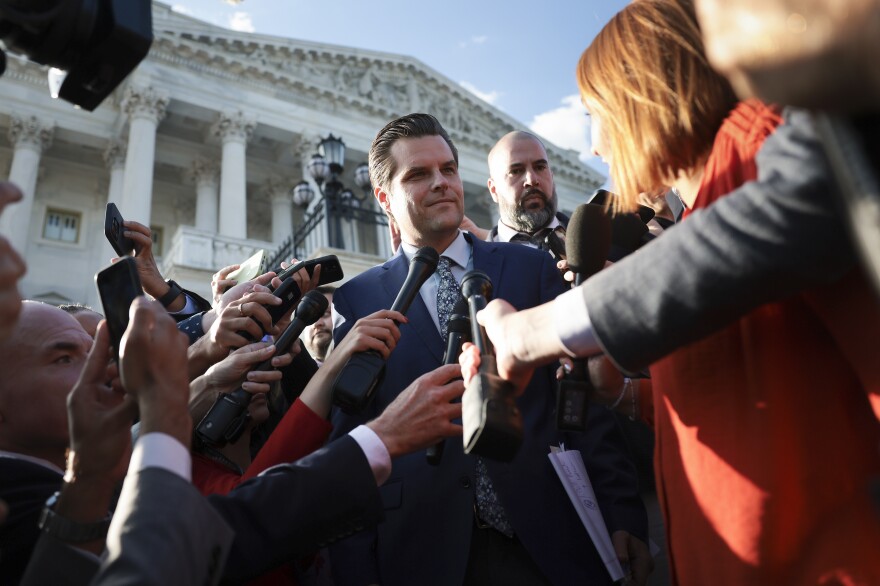Kevin McCarthy's run as speaker was relatively short and anything but sweet.
On Tuesday, he was taken down from both sides of the aisle, as eight Republicans joined all Democrats in a historic 216-210 vote to vacate the seat.
By the end of the night, an interim speaker had been named but there was little certainty about who would ultimately be elected to the role.
Here are four takeaways from a day of turmoil at the Capitol.

1. We're in uncharted territory
First, a bit of context.
McCarthy was elected speaker in January after 15 rounds of voting. He managed to finally secure the gavel, in part by agreeing to demands from a fringe group of Republicans to change the rules on who can propose a resolution to remove the speaker — allowing just one member to do it.
Enter Florida Rep. Matt Gaetz.
Gaetz never supported McCarthy for speaker, and on Tuesday led the charge against him. He cited McCarthy's decision to pass a short-term spending bill with Democratic support as evidence he had not "fulfilled his promises" to conservatives.
As McCarthy's allies urged calm during Tuesday's debate, saying a vote to vacate the speaker could "plunge [the House] into chaos," Gaetz was quick to turn blame around.
"Chaos is Speaker McCarthy. Chaos is somebody who we cannot trust with their word," Gaetz said.

While Gaetz is the face of the rebellion and the de facto leader of the opposition Republicans who voted against McCarthy, the majority of members of the Republican conference in the House stood by their elected leader.
Iowa Rep. Mariannette Miller-Meeks, a McCarthy supporter, told All Things Considered the vote to vacate the speakership was "disappointing and frustrating," adding that she believed Gaetz was driven by personal animosity and was President Biden's "favorite Republican" because "he's siding with the Democrats."
2. The Republican Party didn't plan for this
The House will be forced to hold a vote on a new speaker, but it's not clear who could win enough votes to secure the position.
McCarthy said he won't run for speaker again. Majority Whip Tom Emmer indicated to reporters he would not run. And House Majority Leader Steve Scalise said he does not have any announcement to make at this time.
Members told reporters that they expect to hold a candidate forum next Tuesday ahead of votes on a speaker, possibly as early as Wednesday.
Republican strategist Ron Bonjean told All Things Considered this isn't how most Republicans would have liked to see this play out.
"I am really shocked on one hand, and on the other hand, it's rather surprising that [McCarthy] lasted this long considering the current dynamics in the House," he said.
He said he didn't believe the group of eight Republicans that voted with Democrats to oust McCarthy had a plan beyond that move.
"And I think that's what's most concerning of all, is that they did this out of retribution for him going ahead and funding the U.S. government," Bonjean said, in reference to the short-term spending bill that was agreed to at the weekend.
It's a point echoed by Miller-Meeks, who said her Republican colleagues asked Gaetz who he wanted to replace McCarthy as speaker, but didn't get a name.
"He has no individual. He has no person," Miller-Meeks said.
3. The Democrats chose not to save McCarthy
Before the vote, there was some speculation that Democrats might step in to save McCarthy by voting "present" rather than in favor of the motion to vacate.
But in the end, McCarthy didn't offer them any concessions and Democrats voted to have him removed.
Democrats say they will now put forward Minority Leader Hakeem Jeffries for speaker — as they did in the rounds of voting in January — but he will almost certainly fall short again in the Republican-majority House.
Former Democratic House member and director of the CIA, Leon Panetta, told All Things Considered that McCarthy was a "failed leader."
"The reason he failed is because too often he capitulated to his opponents, and ultimately lost his credibility and his trust as a result of that, in the hope that ultimately his opponents would somehow be loyal to him," he said. "I think in doing that, he really undermined his credibility as speaker and that cost him."
For his part, McCarthy said he leaves the speakership "with a sense of pride, accomplishment and yes, optimism."
"I hope you realize that every day I did the job, regardless whether you underestimated me or not, I wanted to do it with a smile," he told reporters after the vote.
4. The House will grind to a halt for now
For now, business in the House will come to a standstill.
North Carolina Rep. Patrick McHenry has been named "speaker pro tempore," the interim speaker.

He was handpicked by McCarthy to move up in the line of succession to the speakership if the seat was vacated by a death or a vote to vacate.
The size and scope of McHenry's authority will be played out as the House shakeup will lead to a new permanent leader.
But whoever is elected as the 56th speaker of the House will have to find a way to fund the government and work with Democrats, knowing the more conservative wings of the party can try to take them down in a single vote.
Republican strategist Bonjean said that will need to change.
"There are plenty of Republicans that could do a great job at leading," he said. "It's what they just witnessed which would give many people pause in terms of whether they would actually want to do this job, because it's virtually untenable unless they changed the ability for a small group of Republicans to toss out their leader at a whim."
Vincent Acovino, Gurjit Kaur, Kelsey Snell and Patrick Jarenwattananon contributed to this report. contributed to this story
Copyright 2023 NPR. To see more, visit https://www.npr.org. 9(MDA5NTM4MTIyMDE0MTg3NDc2MTVlZjdmNQ001))




